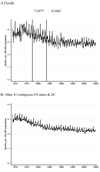Effects of alcohol taxes on alcohol-related mortality in Florida: time-series analyses from 1969 to 2004
- PMID: 20659073
- PMCID: PMC2965314
- DOI: 10.1111/j.1530-0277.2010.01280.x
Effects of alcohol taxes on alcohol-related mortality in Florida: time-series analyses from 1969 to 2004
Abstract
Background: Over a hundred studies have established the effects of beverage alcohol taxes and prices on sales and drinking behaviors. Yet, relatively few studies have examined effects of alcohol taxes on alcohol-related mortality. We evaluated effects of multiple changes in alcohol tax rates in the state of Florida from 1969 to 2004 on disease (not injury) mortality.
Methods: A time-series quasi-experimental research design was used, including non-alcohol deaths within Florida and other states' rates of alcohol-related mortality for comparison. A total of 432 monthly observations of mortality in Florida were examined over the 36-year period. Analyses included ARIMA, fixed-effects, and random-effects models, including a noise model, tax independent variables, and structural covariates.
Results: We found significant reductions in mortality related to chronic heavy alcohol consumption following legislatively induced increases in alcohol taxes in Florida. The frequency of deaths (t = -2.73, p = 0.007) and the rate per population (t = -2.06, p = 0.04) declined significantly. The elasticity effect estimate is -0.22 (t = -1.88, p = 0.06), indicating a 10% increase in tax is associated with a 2.2% decline in deaths.
Conclusions: Increased alcohol taxes are associated with significant and sizable reductions in alcohol-attributable mortality in Florida. Results indicate that 600 to 800 lives per year could be saved if real tax rates were returned to 1983 levels (when the last tax increase occurred). Findings highlight the role of tax policy as an effective means for reducing deaths associated with chronic heavy alcohol use.
Copyright © 2010 by the Research Society on Alcoholism.
Figures
Similar articles
-
Effects of alcohol taxes on alcohol-related disease mortality in New York State from 1969 to 2006.Addict Behav. 2012 Jul;37(7):783-9. doi: 10.1016/j.addbeh.2012.02.019. Epub 2012 Mar 1. Addict Behav. 2012. PMID: 22436591 Free PMC article.
-
Alcohol tax, consumption and mortality in tsarist Russia: is a public health perspective applicable?Eur J Public Health. 2013 Apr;23(2):340-4. doi: 10.1093/eurpub/cks079. Epub 2012 Jul 11. Eur J Public Health. 2013. PMID: 22791368
-
How many alcohol-attributable deaths and hospital admissions could be prevented by alternative pricing and taxation policies? Modelling impacts on alcohol consumption, revenues and related harms in Canada.Health Promot Chronic Dis Prev Can. 2020 Jun;40(5-6):153-164. doi: 10.24095/hpcdp.40.5/6.04. Health Promot Chronic Dis Prev Can. 2020. PMID: 32529975 Free PMC article.
-
The effects of prices on alcohol use and its consequences.Alcohol Res Health. 2011;34(2):236-45. Alcohol Res Health. 2011. PMID: 22330223 Free PMC article. Review.
-
Effective prevention against risky underage drinking--the need for higher excise taxes on alcoholic beverages in Germany.Alcohol Alcohol. 2010 Jul-Aug;45(4):387-94. doi: 10.1093/alcalc/agq031. Epub 2010 Jun 16. Alcohol Alcohol. 2010. PMID: 20554697 Review.
Cited by
-
Alcohol policy effects on 100% chronic alcohol-attributable mortality across racial/ethnic subgroups.Prev Med. 2021 Apr;145:106450. doi: 10.1016/j.ypmed.2021.106450. Epub 2021 Feb 5. Prev Med. 2021. PMID: 33549683 Free PMC article.
-
Toward rigorous idiographic research in prevention science: comparison between three analytic strategies for testing preventive intervention in very small samples.Prev Sci. 2013 Jun;14(3):267-78. doi: 10.1007/s11121-012-0311-4. Prev Sci. 2013. PMID: 23299558 Free PMC article.
-
Evaluation of Alcohol Taxes as a Public Health Opportunity to Reduce Liver Transplant Listings for Alcohol-Related Liver Disease.Alcohol Clin Exp Res. 2020 Nov;44(11):2307-2315. doi: 10.1111/acer.14454. Epub 2020 Oct 16. Alcohol Clin Exp Res. 2020. PMID: 32944958 Free PMC article.
-
The Effects of the Global Economic Recession and a Reduced Alcohol Tax on Hospitalizations Due to Alcohol-Attributed Diseases in Taiwan.Int J Environ Res Public Health. 2017 May 30;14(6):580. doi: 10.3390/ijerph14060580. Int J Environ Res Public Health. 2017. PMID: 28556807 Free PMC article.
-
Area-Level Social Determinants of Alcohol-Related Mortality: Knowledge Gaps and Implications for Community Health.Alcohol Res. 2024 Oct 31;44(1):06. doi: 10.35946/arcr.v44.1.06. eCollection 2024. Alcohol Res. 2024. PMID: 39493696 Free PMC article. Review.
References
-
- Akaike H. A new look at the statistical model identification. IEEE Transactions on Automatic Control. 1974;19(6):716–723.
-
- Boffetta P, Hashibe M. Alcohol and cancer. The Lancet Oncology. 2006;7(2):149–156. - PubMed
-
- Brockwell PJ, Davis RA. Introduction to Time Series and Forecasting. 2nd ed. New York: Springer; 2002.
Publication types
MeSH terms
Grants and funding
LinkOut - more resources
Full Text Sources
Medical



